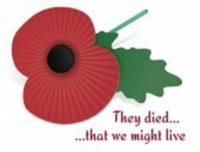 We’re just a day away from the unofficial start of summer–and that’s all many of us care about. A few have headed to the shore or mountains, but most of us, locked down as we are thanks to COVID-19, have stayed put, heading outside from time to time for a bit of exercise, and/or laying back with a movie or two, resting up, and maybe firing up the grill.
We’re just a day away from the unofficial start of summer–and that’s all many of us care about. A few have headed to the shore or mountains, but most of us, locked down as we are thanks to COVID-19, have stayed put, heading outside from time to time for a bit of exercise, and/or laying back with a movie or two, resting up, and maybe firing up the grill.
No remote learning tomorrow, and for many, no working from home either. Yay!
For this long weekend, we owe the National Holiday Act of 1971, which moved Memorial Day from May 30 to the last Monday in May—and thus diminished the day’s very intent.
As U.S. Air Force veteran Dan Littley, chairman of Pennsylvania’s Towamencin Township’s board of supervisors, said at a 2012 Memorial Day ceremony: “The solemnity of this day has been forgotten. We’ve lost the reason for this holiday and have forgotten the men who made the ultimate sacrifice.”
So how did we get to such a point?
It all started back on May 5, 1868 when Memorial Day was officially established by General John Logan, national commander of the Grand Army of the Republic, a fraternal organization made up of Union Army veterans. As he proclaimed at the time: “Let no vandalism or avarice or neglect, no ravages of time testify to the present or to the coming generations that we have forgotten as a people the cost of a free and undivided republic.”
That May 30, the very first Memorial Day, was celebrated with the laying of flowers on the graves of both Union and Confederate soldiers at Arlington National Cemetery. From then on, May 30 was the day set aside to honor fallen Civil War soldiers.
That would change to include the dead of all wars, however, after World War I which erupted in Europe in 1914. Deeply affected by it was a young teacher named Moina–her story deftly told by Barbara Elizabeth Walsh in her children’s book, The Poppy Lady: Moina Belle Michael and Her Tribute to Veterans. Singlehandedly, Ms Michael changed how we honor our deceased military—and yet few have ever heard of her.
You see, when President Woodrow Wilson announced America’s entry into the war in 1917, she vowed to help our soldiers and ensure that they’d never be forgotten. Inspiring her was a poem written by Lieutenant John McCrae in tribute to those who’d lost their lives on the Flanders Fields battleground and were buried there. Its last lines read:
“If ye break faith with those who die
We shall not sleep, though poppies grow
in Flanders Fields.”
The rest, as they say, is history.
Thanks to Ms. Michael’s tireless efforts, red poppies became a national emblem of remembrance and support for all veterans, and their sale ultimately raised millions of dollars for veterans, war widows, and orphans. Indeed, upon her death, veterans made 3,223 poppies and wove them into a blanket they placed on her grave. And, to this day, they give out red poppies on both Memorial Day and Veterans Day. Wear one with gratitude and be reminded of the true spirit of this set-aside day and the efforts of Moina Belle Michael.
And holding true to General Logan’s original intent that we never forget our fallen men and women, teach your children well, together putting up your flag, and, if possible, planting a few red poppies in the garden, too, in gratitude.
Then do yourself one better and send a much needed care package to our troops as a way of giving thanks.
With gratitude and good Memorial Day wishes, Carol
Thank you for sharing this history, Carol. I wish I had a red poppy to wear. I will share this post today.
They’re still around, but, I’m afraid, we pay too little attention to our history, and the accompanying stories that bring it to life.
A lovely informational piece. From the time it was instituted, the changes of almost all holidays to a Friday or Monday has bothered me. It was done, I believe, to negate companies and businesses having to disrupt their work week and thus, affect their finances. That move, in one man’s opinion, underscores “Money is the root of all evil.”
I heard on the news last night that Memorial Day was once called “Decoration Day.” I wonder if anyone else had ever heard that?
Carol: Thanks, as always, for keeping us informed.
With great thanks, Sarge, for your thoughts. And, yes, indeed, it was once called Decoration Day: “Three years after the Civil War ended, on May 5, 1868, the head of an organization of Union veterans — the Grand Army of the Republic (GAR) — established Decoration Day as a time for the nation to decorate the graves of the war dead with flowers.”
Thanks Carol for retelling this poignant story from our history. And yes, Sargent, my father used to call it Decoration Day. There were always Poppies to wear on your lapel, and a donation box nearby.
And how the times have changed and the gratitude, too, I’m afraid.